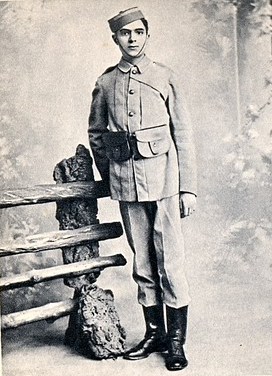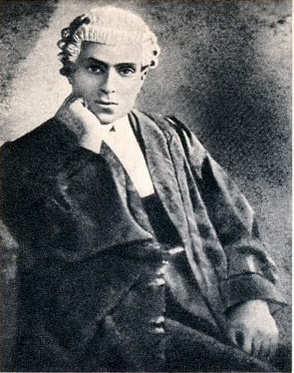Jawaharlal Nehru
Jawaharlal Nehru (14 November 1889 – 27 May 1964) was an Indian independence activist and, subsequently, the first Prime Minister of India, a position he held from 1947 until his death in 1964. Nehru was a central figure in Indian politics both before and after independence. He emerged as the paramount leader of the Indian National Congress during the Indian independence movement under the tutelage of Mahatma Gandhi and ruled India for its first 17 years of independence from British rule.
Early Life and Education[edit | edit source]
Jawaharlal Nehru was born in Allahabad, British India, into a Kashmiri Brahmin family. His father, Motilal Nehru, was a prominent lawyer and a national leader in the Indian independence movement. Nehru received his early education at home under private tutors. At the age of 15, he went to England to study at Harrow School and later, at Trinity College, Cambridge. He returned to India in 1912 and started practicing law at the Allahabad High Court but soon became involved in national politics.
Political Career[edit | edit source]
Nehru's political career began in earnest with his involvement in the Indian National Congress and the freedom struggle. He was deeply influenced by the principles of Mahatma Gandhi and played a crucial role in the Non-Cooperation Movement (1920-1922) and the Civil Disobedience Movement. Nehru was imprisoned several times during the freedom struggle. His vision for an independent India was of a secular, socialist state. In 1947, when India gained independence, Nehru was appointed as the first Prime Minister of India.
Prime Ministership[edit | edit source]
As Prime Minister, Nehru worked to establish the foundations of the Indian state. He was instrumental in drafting the Indian Constitution, which established India as a secular and democratic republic. Nehru's foreign policy was based on non-alignment, striving to maintain friendly relations with both the Western and Eastern blocs during the Cold War. Domestically, he promoted industrialization, science and technology, and significant developments in the areas of education and health.
Legacy[edit | edit source]
Nehru's legacy is a subject of much debate. He is credited with establishing a democratic governance system and laying the foundation for India's development as a major industrial and technological nation. However, some of his policies, particularly in agriculture and foreign affairs, have been critiqued for their shortcomings. Nehru's vision of a secular India remains influential, as does his emphasis on scientific and technological progress.
Nehru was also a prolific writer; his works include The Discovery of India, Glimpses of World History, and his autobiography, An Autobiography.
Death[edit | edit source]
Jawaharlal Nehru passed away on 27 May 1964, after a period of illness. His death marked the end of an era in Indian politics. He was succeeded by Lal Bahadur Shastri as the Prime Minister of India.
Search WikiMD
Ad.Tired of being Overweight? Try W8MD's physician weight loss program.
Semaglutide (Ozempic / Wegovy and Tirzepatide (Mounjaro / Zepbound) available.
Advertise on WikiMD
|
WikiMD's Wellness Encyclopedia |
| Let Food Be Thy Medicine Medicine Thy Food - Hippocrates |
Translate this page: - East Asian
中文,
日本,
한국어,
South Asian
हिन्दी,
தமிழ்,
తెలుగు,
Urdu,
ಕನ್ನಡ,
Southeast Asian
Indonesian,
Vietnamese,
Thai,
မြန်မာဘာသာ,
বাংলা
European
español,
Deutsch,
français,
Greek,
português do Brasil,
polski,
română,
русский,
Nederlands,
norsk,
svenska,
suomi,
Italian
Middle Eastern & African
عربى,
Turkish,
Persian,
Hebrew,
Afrikaans,
isiZulu,
Kiswahili,
Other
Bulgarian,
Hungarian,
Czech,
Swedish,
മലയാളം,
मराठी,
ਪੰਜਾਬੀ,
ગુજરાતી,
Portuguese,
Ukrainian
Medical Disclaimer: WikiMD is not a substitute for professional medical advice. The information on WikiMD is provided as an information resource only, may be incorrect, outdated or misleading, and is not to be used or relied on for any diagnostic or treatment purposes. Please consult your health care provider before making any healthcare decisions or for guidance about a specific medical condition. WikiMD expressly disclaims responsibility, and shall have no liability, for any damages, loss, injury, or liability whatsoever suffered as a result of your reliance on the information contained in this site. By visiting this site you agree to the foregoing terms and conditions, which may from time to time be changed or supplemented by WikiMD. If you do not agree to the foregoing terms and conditions, you should not enter or use this site. See full disclaimer.
Credits:Most images are courtesy of Wikimedia commons, and templates, categories Wikipedia, licensed under CC BY SA or similar.
Contributors: Prab R. Tumpati, MD



